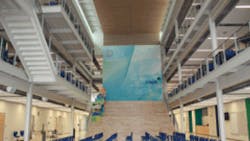With a goal of better preparing students to succeed in the 21st-century business world, the Blue Valley School District in Overland Park, Kan., last year created the Center for Advanced Professional Studies (CAPS).
The program enables high-school juniors and seniors to work with professional mentors who provide hands-on real-world experience in one of four career areas—bioscience; business, technology and media; engineering and human services. For the first year, many students traveled to satellite sites at area businesses to attend classes and by assisting on actual work projects, getting a sample of what they can expect when they enter the business world.
Now, the program has entered a new phase. The district has unveiled a facility built specifically to house CAPS: a sustainably designed 66,205-square-foot, $11.6 million building. Each school day, CAPS students who have been accepted into the program spend half the day at one of Blue Valley’s five traditional high school campuses, and the other half (either morning or afternoon) at the CAPS facility, where they meet for 2.5-hour blocks.
Though it accommodates classes for high-school students, the three-story CAPS facility doesn’t look like a high school. The building is meant to approximate the feel of a real business environment, executive director Donna Deeds says. That means the traditional teenage uniform of t-shirt, shorts and gym shoes is supplanted in the CAPS building by apparel that fits the dress codes and business environment of the career field the students are learning about.
It also means higher expectations are placed on students. CAPS participants are expected to embrace a level of responsibility and commitment required from a professional employee.
To assist the students, Blue Valley has formed partnerships with more than 150 businesses, higher-education institutions and other government entities. The district anticipates that about 500 students will take classes at the CAPS facility in 2010-11. The program is offering 25 courses this year in the four career "strands."
The business, technology and media strand is divided into three pathways: global business, technology solutions, and media. Pathways in the human services strand consist of teacher education, health sciences, and law and public safety.
Built on a central location in the school district, the CAPS facility incorporates numerous green features, such as extensive use of daylighting to illuminate the building and high-efficiency lighting.
The facility also gives students an opportunity to work with professional-level equipment in fields such as digital electronics, aerospace, computer-aided manufacturing, bioscience research, multimedia production and sports medicine. The building has many places for informal gathering, where students can meet with each other or their mentors, or plug in their laptops to do some spur-of-the-moment research.
In addition to gaining real-world business knowledge and experience, students receive high-school credits, and in some cases, college credits.
Blue Valley officials say they are hopeful that the CAPS program exhibits enough promise to serve as a model for other school systems looking to create career-oriented programs that depend on business partnerships.
Kennedy, staff writer, can be reached at [email protected].
About the Author
Mike Kennedy
Senior Editor
Mike Kennedy, senior editor, has written for AS&U on a wide range of educational issues since 1999.
